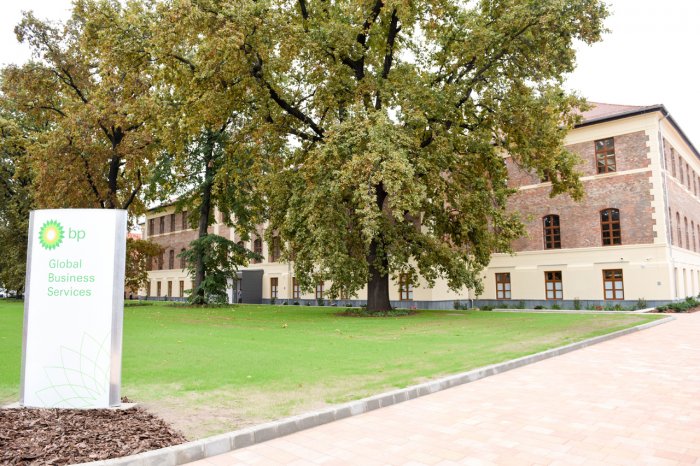Budapest vs Countryside: Where to Place Your BSC?

Budapest is, without a doubt, a favorite with tourists from all over the world and it is so for a reason. The city’s great architecture, excellent infrastructure and cool vibe are the very same qualities make the city a popular location for shared services centers, or business services centers as they are more commonly known now.
BP’s BSC in the southern city of Szeged.
These have been thriving in the Hungarian home over the past 10-15 years; many of the largest multinationals have brought service functions here. The availability of skilled workforce has played a significant role in that decision, as has the fact that labor costs less than in the West (though this seem to be a less important consideration these days).
Overall, Budapest is firmly on the map of international locations for BSCs. It may not be on par with Frankfurt, or New York – and certainly not salary wise – but it is definitely competitive within Europe with, for example, Dublin.
“Many organizations chose to come here because of the infrastructure and the skillset of professionals,” Balázs G. Nagy, president of the Hungarian Outsourcing Association tells the Budapest Business Journal.
He cites the UN as an example; the organization has an international pay scale, so salary was not a consideration when selecting the site. Companies tend to choose to come to Hungary because there is added value – it is no longer call centers they wish to establish here.
According to the 2018 survey by HOA and HIPA, which gives a 360-degree view of the market, the main reason for companies to move their services to Hungary were efficiency and productivity (38%). Cost arbitrage is still high up the list (at 34%), but service quality (22%) and skills and availability (17%) are also significant.
Countryside Offer?
So what can a Hungarian countryside location provide if Budapest has so much to offer? To start off, it is not a fair comparison, according to Nagy. Budapest is a city of 1,752,286, while the second city in Hungary, Debrecen, has population of just 201,432 (both sets of figures are from the Central Statistical Office, and dated to the start of this year).
Still, there are many advantages to establishing a center in a provincial city. There is an independent talent pool, which may be easier to call on. Due to smaller labor market size and the relative lack of opportunities in the countryside, a company can make more “noise” and draw more skilled/talented employees than in Budapest, Nagy says.
The relationship with universities, which can provide a constant supply of well-educated graduates is more direct – large universities and companies in the capital are more overburdened, the HOA president adds.
Salaries may be lower (though not necessarily for managers), but the cost of living is lower too. One can achieve a better work-life balance by not having to commute hours to work. The management of the city may also be more flexible; a local transportation company may be more willing to add a stop than in Budapest, the president notes.
Countryside service centers first appeared about four or five years ago – and though a number of them have been opened only after a first BSC was established and operating successfully in Budapest, not all come from a “second wave”.
International Competition
Flowserve in Debrecen, is one example: the city won an international competition to host the firm thanks to its infrastructure and university, as well as the municipality’s development activities.
“Countryside cities see this as a sector for the future and are willing to catch up,” says Richárd Ránki-Kovács, managing director of HOA. In Debrecen, business have teamed up and created a roundtable to promote the sector’s reputation, raise awareness, and shape/improve education, Ránki-Kovács says. They are in close cooperation with the local university, which has added subjects to its curriculum. A similar working group was created within the American Chambers of Commerce, involving a higher number of players.
A number of other cities are also working hard to attract business centers, with the aim to ensure employment for graduates. The pool of skilled workforce and productivity play a more important role than cost arbitrage, Ránki-Kovács confirms.
HOA has been organizing a series of professional events for companies: this year they have held sessions where countryside cities Debrecen, Szeged and Miskolc presented themselves to company heads. The events will continue next year with cities such as Székesfehérvár and Győr.
Office space is a bottleneck, HOA acknowledges, but is something that cities have started to focus on.
“In Debrecen, for example, a newly developed category “A” office have been developed; Szeged is also planning some developments, as does Miskolc, where they are planning to convert municipality offices,” Ránki-Kovács says.
Business Services Centers: The Numbers Have It
Increasing the number of locations for BSCs by improving conditions makes business sense. According to data by HIPA, the importance of the sector is shown by the fact that more than 50,000 employees at the 110 companies operating on the Hungarian market provided 1.2% of Hungarian GDP in 2018 and 1.6% of the entire Hungarian exports, while 1.1% of all employees work in these centers. Of that total, 32,769 worked in Budapest, and 7,584 in Tier 2 cities (Székesfehérvár 2,830; Debrecen 3,616; Szeged 864; Pécs 274). The number of employees working in the business services sector in Tier 2 cities increased last year, with the highest growth in terms of employed people was achieved in Debrecen, Szeged and Székesfehérvár.

Balázs G. Nagy
SUPPORT THE BUDAPEST BUSINESS JOURNAL
Producing journalism that is worthy of the name is a costly business. For 27 years, the publishers, editors and reporters of the Budapest Business Journal have striven to bring you business news that works, information that you can trust, that is factual, accurate and presented without fear or favor.
Newspaper organizations across the globe have struggled to find a business model that allows them to continue to excel, without compromising their ability to perform. Most recently, some have experimented with the idea of involving their most important stakeholders, their readers.
We would like to offer that same opportunity to our readers. We would like to invite you to help us deliver the quality business journalism you require. Hit our Support the BBJ button and you can choose the how much and how often you send us your contributions.











